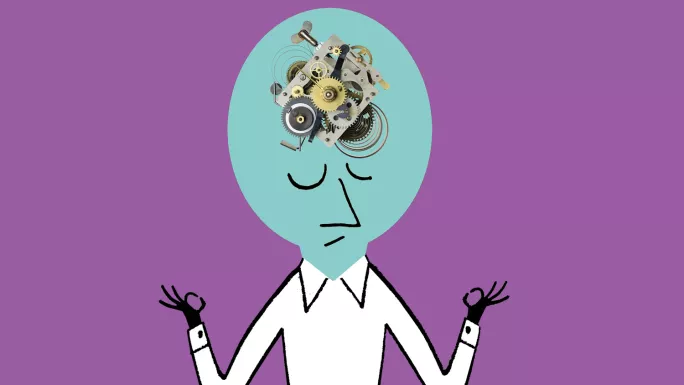Have we forgotten to teach pupils how to learn?

Russell Harrison is talking about pineapple-shaped swimming pools. In a classroom. With around 30 Year 6 pupils. During a maths lesson.
Ostensibly, this is to test the pupils’ skills in calculating perimeter and area, as that appears to be the focus of the lesson. But lean in closer and listen a little keener, and you will realise there is another, more pressing motive: Harrison, assistant head at Alderwood Primary School in Greenwich, is teaching the children how to learn.
You see, the pineapple had come up because Harrison had been discussing using a visualisation technique to remember the difference between area and perimeter. After one pupil suggested the visual of a swimming pool, Harrison decided to use this as an example.
His objective was to make it clear to the class that while we all struggle to remember things sometimes, what works for one person as a reminder might not work for others: the children would need to find a visual association that worked for them. A pineapple-shaped swimming pool may or may not be the right fit.

Such explicit teaching of memory techniques and modelling of the learning process may not seem unusual. Is teaching a child how to learn - alongside helping them to learn - not what every teacher worth their salt does every day?
Well, in theory, yes. In practice?
“I have yet to meet a teacher who doesn’t think metacognition is important, yet there are many classrooms where it is not intentionally promoted and taught,” says Simon Camby, group director of education for the global schools’ group Cognita.
He is not alone in that view. Metacognition - learning how to learn - has decades of research behind it. It is the subject of a substantial Education Endowment Foundation report - Metacognition and Self-regulated Learning - out today (download it from bit.ly/EEFreports), espousing its importance, and it has few critics.
And yet while most teachers have heard of the concept, and some might even know something about how to teach metacognitive skills, actually doing it explicitly is not as common as it could be and understanding around what is proven to work is still hazy.
So, if teaching metacognition really is important, and we have known that for decades, why doesn’t everyone know how to do it well? And why isn’t it already happening in every classroom?
In its simplest form, metacognition is the ability to think about our own thought processes. Professor Robert Savage, head of the department of psychology and human development at the UCL Institute of Education, describes it as “a capacity for reflection”. “It’s the ability to reflect on what you are thinking or learning about,” he says.
What does that actually mean, practically?
Dr Shirley Larkin, senior lecturer in education at the University of Exeter, explains that there are two distinct processes involved.
The first is the “development of metacognitive knowledge”.
“This is knowledge of your own thinking processes. It develops with age and experience,” she explains. “So you can say, ‘I know I have a good memory for faces but not for names,’ or, ‘I know I cannot do maths because my brain doesn’t work like that.’
“You can see that metacognitive knowledge can be true or false, helpful or unhelpful. So it is important that teachers facilitate helpful metacognitive knowledge.”
So stage one is having an understanding of how your brain works - and the effect that these workings can have on your ability to complete tasks or solve problems. This might mean being aware, for example, that just because you are looking at the personal identification number (PIN) for your new bank card right now, that doesn’t mean you will be able to remember that number later, when you are trying to pay for your shopping. Your memory simply doesn’t work like that.
Strategic thinking
The second process, Larkin says, is regulation of our thinking. This involves identifying and applying strategies to support our mental processes - and then monitoring the effectiveness of those strategies, to check that they are working.
In our very basic example above, of trying to remember a new PIN, you might come up with a couple of mnemonics, one of which links the digits to a memorable date and another which links them to letters of the alphabet. Later, when you are standing at the till in the supermarket, you realise that you are unable to recall the date - since it is just another number - and turn to the alphabet mnemonic instead. This does the trick. Next time, you will know that a letter-based mnemonic is the best way to go.
You may assume that these skills are picked up naturally through the process of learning itself - that you don’t need an explicit lesson in it. Savage concedes that it is something that many of us - as skilled adult learners - will come to do automatically. These strategies are usually developed through exposure to what Savage calls a “rich lived environment” in which we encounter lots of different things. “Whether we are taught these skills explicitly or not, good learners tend to develop metacognition strategies,” he says.
But, through no fault of their own, some children do not have that “exposure” to the “rich lived environment”. As such, there is no natural learning process for metacognitive skills and they arrive at school unable to self-regulate and then struggle to pick up that skill through the normal learning process.

This can have a significant negative impact. The ability to self-regulate is crucial not just at school, but also in later life.
“Sophisticated metacognition is important for intellectual development and for our performance in school and beyond,” confirms Rose Luckin, professor of learner-centred design at the UCL Institute of Education. “People who develop good self-regulation skills are more likely to fulfil their potential and achieve.”
In terms of academic achievement, the research certainly suggests that this is the case. A number of empirical studies have demonstrated a connection between metacognition and levels of attainment.
“There is compelling evidence from a range of global sources that the effective promotion and teaching of metacognition impacts positively on the achievement of students,” says Camby.
According to the Education Endowment Foundation Teaching and Learning Toolkit, self-regulation approaches have “consistently high levels of impact”. A 2014 EEF study, Improving Writing Quality (bit.ly/EEFwriting), used a structured programme of writing development based on a self-regulation strategy and found gains, on average, of an additional nine months’ progress. And in 2015, three more evaluations around metacognition in the classroom found gains of between two and five months’ additional progress - and demonstrated that pupils from low-income families, in particular, benefited.
These strategies are, the EEF Toolkit points out, “particularly effective” for low-achieving pupils.
And, from a school leadership perspective, teaching metacognition is recognised as a very cost-effective way of improving pupil progress. The EEF Toolkit estimates that most projects would cost under £80 per pupil.
So if it is proven to work, is integral to learning and is good value, why isn’t it already being taught in every classroom?
It is partly a communication issue. Christian Bokhove, associate professor of mathematics education at the University of Southampton - who conducted the literature review for the EEF report, along with Ofsted head of research Professor Daniel Muijs - believes that the breadth of research around metacognition causes problems.
“In essence, the label ‘metacognition’ is so broad that one has to look ‘inside’ the term for the most useful conclusions,” he says.
In other words, it’s only by picking apart all of the different elements involved in metacognition, and trying some of the strategies out for yourself, that you can truly understand how these elements can be applied to the classroom. Most teachers do not have the toolset or time to do that.
The communication issue is compounded by the fact that while initial teachertraining (ITT) courses might touch on metacognitive approaches, they rarely cover it comprehensively. And if you’re going to help students to do this well, comprehensive understanding is what you need, according to Andrew Foster, a former teacher and now head of education for training provider Tougher Minds.
“It’s a big ask to expect schools to be experts in the science of learning, because this isn’t what teachers are trained in. Everything is subject-based,” he explains. “Teachers can’t be expected to replicate the level of understanding that comes from years of conducting trials and reiterations.”
Alistair McConville, deputy head (academic) at Bedales School in Hampshire, agrees that the complexity of metacognition could explain why courses don’t cover it in depth. “It is a very specialist area, frankly,” he explains. “Subject teachers are specialists in their subjects.”
That’s not to say teachers never get any training, but it tends to depend on the school, or more likely whoever is in charge of CPD.
However, even where this training is happening in schools, there is still the matter of actually building metacognition into lesson planning. With so many competing demands on teachers, it is not surprising that many just don’t find the time - and that delivering subject content tends to take over.
“It’s not straightforward to teach metacognition, and I wonder if part of the reason for the existing confusion is that it’s not specifically assessed and, therefore, perhaps it never quite gets to the top of the priority list,” says Luckin.
A new approach
Finally, there is another hurdle to overcome: actually pinpointing the most useful ways to communicate the techniques to learners.
“The term metacognition is becoming increasingly well-known in schools and we know that teachers are really interested in it. But beyond a simple definition of ‘thinking about thinking’, it can be really hard to describe what it means in the classroom,” says Eleanor Stringer, senior programme manager at the EEF.
So, does the new EEF report - and the existing research - offer any clues about what a better approach to metacognition might look like?
The authors of the EEF report have made seven recommendations.
The first is for teachers to “develop the professional knowledge and skills that will help their pupils develop as self-regulating learners”. In other words, teachers need to improve their own awareness of what metacognition is and how learners self-regulate - and learn to recognise when it is happening in the classroom. Reading the EEF report, or an article like this, is a good first step.
The next recommendation is for teachers to use their new awareness to “explicitly teach pupils metacognitive strategies, including how to plan, monitor and evaluate their learning”. This, says Stringer, is easier said than done, because what teaching metacognitive strategies looks like will depend on the topics you are teaching.
“There’s certainly no simple method or trick,” she points out.
However, in general, she says, effective metacognitive strategies include helping pupils to set themselves goals and consider how they will approach tasks, and showing them how to check the progress they are making and how to assess the effectiveness of their chosen strategies.
The experts agree that these strategies should be practised in context, as part of subject teaching. The report warns against trying to teach them as part of separate “thinking skills” sessions.
“If the separation is real for the children, then they won’t necessarily make the connection. So strategies should be taught in context,” says Savage.
Stringer adds: “Some schools have interpreted the evidence to mean that they should be running ‘learning to learn’ lessons, but actually, since strategies should be quite task-specific, the evidence suggests that they are best taught through subject content,” she says.
Recommendations three and four give some indication of how this could happen: teachers should “model their own thinking” to pupils - for example, by verbalising their own metacognitive processes as they work through tasks - and “promote and develop metacognitive talk in the classroom”, which involves “asking challenging questions, guiding pupils with oral feedback, prompting dialogue and scaffolding productive ‘exploratory’ talk”.
Many teachers will feel that they do these things already. Harrison agrees that they probably do, but he points out that the key thing here is to be conscious of the strategies and to plan for them specifically.
“It’s something we do already, but not the conscious planning of it and making it explicit. And we need to be explicit about it to get pupils doing it automatically,” he says.
Camby agrees with this. “Metacognition needs to be actively planned for,” he says. “Even with the best intentions, it probably will not happen if not.”
Independent learning
The EEF’s fifth and sixth recommendations suggest that lessons should involve “an appropriate level of challenge to develop pupils’ self-regulation and metacognition” - just enough to make students struggle, but not so much that they become overloaded - and that teachers should “explicitly teach pupils how to organise, and effectively manage, their learning more independently”. For example, they could show them how to space out practice into a number of short sessions over a long period of time, rather than attempting to “cram” learning into one longer session.
Barbara Oakley, a professor of engineering at Oakland University, in the US state of Michigan, and the creator of the massive open online course (Mooc) “Learning how to Learn”, believes that teaching students about strategies such as spaced practice will be even more effective if you also give them a grounding in how their brains work, educating them on a very basic level about things like neurons and working memory.
“If you don’t know how your brain works, you can sit down and try to learn something and when it doesn’t click the first time, you think, ‘Well, I’m stupid. I don’t have the math gene or the language gene and so I just can’t do that,’” Oakley says.
“Pupils don’t know that it’s perfectly normal to not have something click the first time you hear it or look at it.”
Teaching pupils about how their brains work is a technique that Harrison has used successfully. He explains that his pupils “understand that they have neurological pathways and know the difference between knowledge and forgetting”, which helps them to make sense of the new strategies he teaches them.
However, for any metacognitive practice to be really effective, Harrison is also adamant that it needs to be part of a whole-school strategy; all teachers and leaders need to be on board, building work around metacognition into the curriculum and into CPD programmes. Metacognition shouldn’t be an add-on, or an afterthought - or something that just one maverick teacher is doing with one Year 6 class.
“We are training our learning support assistants in this and getting them to learn how to do the techniques, so they can communicate it to the students, too,” Harrison says.
This is something that the EEF has recognised. The final recommendation of the new report is that “schools support teachers to develop their knowledge of these approaches and expect them to apply them appropriately”.
This includes developing teachers’ understanding through high-quality professional development, and ensuring that promoting metacognition is not an “extra” task for teachers, but that it is “built into their teaching activities”.
If what we are really looking for is a change in culture, then, surely it shouldn’t be happening only on a school-by-school basis. Might it instead be necessary to go further up the chain and incorporate learning about metacognition into teacher training, or even build it into our assessment systems?
Oakley certainly thinks so. And, according to her, it might not be long before everyone working in education thinks so, too.
“In the years to come, people will say, ‘You’re kidding. We didn’t use to have this?’” she says. “‘Isn’t it crazy that we used to not even teach students how to learn?’ It’s mind-boggling when you think about it - that students go through 12 to 16 years of education and never get a single course on how to learn effectively.”
Helen Amass is deputy features editor for Tes and a former teacher. She tweets @Helen_Amass
You need a Tes subscription to read this article
Subscribe now to read this article and get other subscriber-only content:
- Unlimited access to all Tes magazine content
- Exclusive subscriber-only stories
- Award-winning email newsletters
Already a subscriber? Log in
You need a subscription to read this article
Subscribe now to read this article and get other subscriber-only content, including:
- Unlimited access to all Tes magazine content
- Exclusive subscriber-only stories
- Award-winning email newsletters